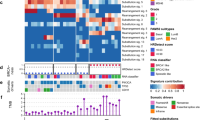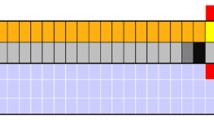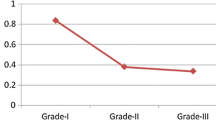Abstract
Germline mutations at BRCA1 or BRCA2 genes result in susceptibility to breast and ovarian cancers. BRCA1- and BRCA2-associated tumors have distinct histologic and molecular phenotypes, as compared to sporadic breast tumors. Typically, a higher grade of malignancy is observed in BRCA-associated cancers. A number of studies have suggested that BRCA1 and BRCA2 proteins are of importance in DNA repair and maintenance of genome integrity, bringing about molecular models of tumor pathogenesis. In particular, alterations at p53 gene have been suggested to be a necessary step in the tumorigenesis of BRCA-associated carcinomas. In fact, BRCA-associated breast cancers have higher p53 mutation frequencies than sporadic ones. At present, very little is known regarding BRCA non-associated familial tumors (termed BRCAx tumors). To our knowledge no data is available on p53 alterations in this sub-group of familial tumors. In this study p53 alteration frequencies were evaluated in 13 BRCA1, 11 BRCA2 and 55 BRCAx breast tumors. Tumor samples were analyzed for p53 gene mutations by PCR-SSCP/direct sequencing, and for p53 protein overexpression by immunohistochemistry (IHC). Altogether, p53 alterations were detected in 54% of BRCA1 tumors compared with 5% of BRCAx tumors. No p53 alteration was found in BRCA2 tumors. While loss of p53 checkpoint control is likely to be an important step in the molecular pathogenesis of BRCA1-associated cancers, our data seem to indicate a p53-independent molecular mechanism underlying BRCAx neoplastic transformation.
Similar content being viewed by others
References
Lakhani SR, Jacquemeier J, Sloane JP, Gusterson BA, Anderson TJ, van de Vijver MJ, Farid LM, Venter D, Antoniou A, Storfer-Isser A, Smyth E, Steel CM, Haites N, Scott RJ, Goldgar D, Neuhausen S, Daly PA, Ormiston W, McManus R, Scherneck S, Ponder BAJ, Ford D, Peto J, Stoppa-Lyonnet D, Bignon Y-J, Struewing JP, Spurr NK, Bishop DT, Klijn JGM, Devilee P, Cornelisse CJ, Lasset C, Lenoir G, Bjork Barkadottir R, Egilsson V, Hamann U, Chang-Claude J, Sobol H, Weber B, Stratton MR, Easton DF: Multifactorial analysis of differences between sporadic breast cancers and cancers involving BRCA1 and BRCA2 mutations. J Natl Cancer Inst 90: 1138-1145, 1998
Lynch BJ, Holden JA, Buys SS, Neuhausen SL, Gaffney DK: Pathobiologic characteristics of hereditary breast cancer. Hum Pathol 29: 1140-1144, 1998
Berns EMJJ, van Staveren IL, Verhoog L, van de Ouweland AMW, Mejer-van Gelder M, Meijers-heijboer H, Portegen H, Foekens JA, Dorssers LCJ, Klijn JGM: Molecular profiles of BRCA1-mutated and matched sporadic breast tumours: relation with clinico-pathological features. Br J Cancer 85: 538-545, 2001
Hedenfalk I, Duggan D, Chen Y, Radmacher M, Bittner M, Simon R, Meltzer P, Gusterson B, Esteller M, Kallionemi OP, Wilfond B, Borg A, Trent J: Gene-expression profiles in hereditary breast cancer. N Engl J Med 344: 539-548, 2001
Lakhani SR, van de Vijver MJ, Jacquemier J, Anderson TJ, Osin PP, McGuffog L, Easton DF: The pathology of familial breast cancer: predictive value of immunohistochemical markers estrogen receptor, progesterone receptor, HER-2, and p53 in patients with mutations in BRCA1 and BRCA2. J Clin Oncol 20: 2310-2318, 2002
van't Veer L, Dai H, van de Vijver MJ, He YD, Hart AA, Mao M, Peterse HL, van der Kooy K, Marton MJ, Witteveen AT, Schreiber GJ, Kerkhoven RM, Roberts C, Linsley PS, Bernards R, Friend SH: Gene expression profiling predicts clinical outcome of breast cancer. Nature 415: 530-535, 2002
Hedenfalk I, Ringner M, Ben-Dor A, Yakhini Z, Chen Y, Chebil G, Ach R, Loman N, Olsson H, Meltzer P, Borg A, Trent J: Molecular classification of familial non-BRCA1/BRCA2 breast cancer. Proc Natl Acad Sci USA 100: 2532-2537, 2003
Marcus JN, Watson P, Page DL, Narod A, Lenoir GM, Tonin P, Linder-Stephenson L, Salerno G, Conway TA, Lynch HT: Hereditary breast cancer. Pathobiology, prognosis and BRCA1 and BRCA2 gene linkage. Cancer 77: 697-709, 1996
Johannsson OT, Idvall I, Anderson C, Borg Å, Barkardóttir RB, Egilsson V, Olsson H: Tumor biological features of BRCA1-induced breast and ovarian cancer. Eur J Cancer 33: 362-371, 1997
Armes JE, Egan AJM, Southey MC, Dite GS, McCredie MRE, Hopper JL, Venter DJ: The histologic phenotypes of breast carcinoma occurring before age 40 years in women with and without BRCA1 or BRCA2 germline mutations. Cancer 83: 2335-2345, 1998
Robson M, Gilewski T, Haas B, Levin D, Borgen P, Rajan P, Hirschaut Y, Pressman P, Rosen PP, Lesser ML, Norton L, Offit K: BRCA-associated breast cancer in young women. J Clin Oncol 16: 1642-1649, 1998
Loman N, Johannson O, Bendahl P-O, Borg Ä, Fernö M, Olsson H: Steroid receptor in hereditary breast carcinomas associated with BRCA1 or BRCA2 mutations or unknown susceptibility genes. Cancer 83: 310-319, 1998
de Bock GH, Tollenaar RA, Papelard H, Cornelisse CJ, Devilee P, van de Vijver MJ: Clinical and pathological features of BRCA1 associated carcinomas in a hospital-based sample of Dutch breast cancer patients. Br J Cancer 85: 1347-1350, 2001
Eisinger F, Noguès C, Birnbaum D, Jacquemeier J, Sobol H: Low frequency of lymph-node metastasis in BRCA1-associated breast cancer. Lancet 351: 1633-1634, 1998
Marcus JN, Watson P, Page DL, Narod SA, Tonin P, Lenoir GM, Serova O, Lynch HT: BRCA2 hereditary breast cancer patophenotype. Breast Cancer Res Treat 44: 275-277, 1997
Katagiri T, Saito H, Shinohara A, Ogawa H, Kamada N, Nakamura Y, Miki Y: Multiple possible sites of BRCA2 interacting with DNA repair protein RAD51. Genes, Chromosomes Cancer 21: 217-222, 1998
Scully R, Chen J, Plug A, Xiao Y, Weaver D, Feunteun J, Ashley T, Livingston DM: Association of BRCA1 with Rad51 in mitotic and meiotic cells. Cell 88: 265-275, 1997
Hakem R, de la Pompa JL, Sirard C, Mo R, Woo M, Hakem A, Wakeham A, Potter J, Reitmair A, Billia F, Firpo E, Hui CC, Roberts J, Rossant J, Mak TW: The tumor suppressor gene Brca1 is required for embyonic cellular proliferation in the Mouse. Cell 85: 1009-1023, 1996
Ludwig T, Chapman DL, Papaioannou VE, Efstratiadis A: Targeted mutations of breast cancer susceptibility gene homologs in mice: lethal phenotypes of Brca1, Brca2, Brca1/Brca2, Brca1/p53, and Brca2/p53 nullizygous embryos. Genes Dev 11: 1226-1241, 1997
Jonkers J, Meuwissen R, van der Gulden H, Peterse H, van der Valk M, Berns A: Synergistic tumor suppressor activity of BRCA2 and p53 in a conditional mouse model for breast cancer. Nat Genet 29: 418-425, 2001
Xu X, Qiao W, Linke SP, Cao L, Li WM, Furth PA, Harris CC, Deng CX: Genetic interactions between tumor suppressors Brca1 and p53 in apoptosis, cell cycle and tumorigenesis. Nat Genet 28: 266-271, 2001
Friedman LS, Thistlethwaite FC, Patel KJ, Yu VPCC, Lee H, Venkitaraman AR, Abel KJ, Carlton MBL, Hunter SM, Colledge WH, Evans MJ, Ponder BAJ: Thymic lymphomas in mice with a truncating mutation in Brca2. Cancer Res 58: 1338-1343, 1998
Hartman AR, Ford JM: BRCA1 induces DNA damage recognition factors and enhances nucleotide excision repair. Nature Genet 32: 180-184, 2002
Armes JE, Trute L, White D, Southey MC, Hammet F, Tesoriero A, Hutchins A-M, Dite GS, McCredie MRE, Giles GG, Hopper JL, Venter DJ: Distinct molecular pathogeneses of early-onset breast cancers in BRCA1 and BRCA2 mutation carriers: a population-based study. Cancer Res 59: 2011-2017, 1999
Crook T, Brooks LA, Crossland S, Osin P, Barker KT, Waller J, Philp E, Smith PD, Yuluk I, Peto J, Parker G, Allday MJ, Crompton MR, Gusterson BA: p53 mutation with frequent novel codons but not a mutator phenotype in BRCA1-and BRCA2-associated breast tumors. Oncogene 17: 1681-1689, 1998
Ramus SJ, Bobrow LG, Pharoah PDP, Finnigan DS, Fishman A, Altaras M, Harrington PA, Gayther SA, Ponder BAJ, Friedman LS: Increased frequency of TP53 mutations in BRCA1 and BRCA2 ovarian tumours. Genes Chromosomes Cancer 25: 91-96, 1999
Phillips K-A, Nichol K, Ozcelik H, Knight J, Done SJ, Goodwin PJ, Adrulis IL: Frequency of p53 mutations in breast carcinomas from Ashkenazi Jewish carriers of BRCA1 mutations. J Natl Cancer Inst 91: 469-473, 1999
Reedy MB, Hang T, Gallion H, Arnold S, Smith SA: Antisense inhibition of BRCA1 expression and molecular analysis of hereditary tumors indicate that functional inactivation of the p53 DNA damage response pathway is required for BRCAassociated tumorigenesis. Gynecol Oncol 81: 441-446, 2001
Gretarsdottir S, Thorlacius S, Valgardsdottir R, Gudlaugsdottir S, Sigurdsson S, Steinarssdottir M, Jonasson JG, Anamthawat-Jonsson K, Eyfiörd JE: BRCA2 and p53 mutations in primary breast cancer in relation to genetic instability. Cancer Res 58: 859-862, 1998
Martin AM, Kanetsky PA, Amirimani B, Colligon TA, Athanasiadis G, Shih HA, Gerrero MR, Calzone K, Rebbeck TR, Weber BL: Germline TP53 alterations in breast cancer families with multiple primary cancers: is TP53 a modifier of BRCA1? J Med Genet 40: e34, 2003
Lakhani SR, Gusterson BA, Jacquemier J, Sloane JP, Anderson TJ, van de Vijver MJ, Venter D, Freeman A, Antoniou A, Mcguffog L, Smyth E, Steel CM, Haites N, Scott RJ, Goldgar D, Neuhausen S, Daly PA, Ormiston W, McManus R, Scherneck S, Ponder BAJ, Futreal PA, Peto J, Stoppa-Lyonnet D, Bignon I-J, Stuewing JP, Bishop DT, Klijn JGM, Devillee P, Cornelisse CJ, Lasset C, Lenoir G, Barkardottir RB, Egilsson V, Hamann U, Chang-Claude J, Sobol H, Weber B, Easton DF, Stratton MR: The pathology of familial breast cancer: histological features of cancers in families not attributable to mutations in BRCA1 or BRCA2. Clin Cancer Res 6: 782-789, 2000
Azzopardi JG, Chepick OF, Hartman WH, Jafarey NA, Llombart-Bosch A, Ozzelo L: Histological typing of breast tumours. International Histological Classification of Tumours, No 2 Geneva, WHO
Bloom HJG, Richardson WW: Histological grading and prognosis in breast cancer. A study of 1409 cases which 359 have been followed for 15 years. Br J Cancer 11: 359-377, 1997
Sambrook J, Fritsch EF, Maniatis T: Molecular Cloning: A Laboratory Manual. 2nd edn, Cold Spring Harbor Laboratory Press, New York, 1989
Ottini L, D'Amico C, Noviello C, Lauro S, Lalle M, Fornarini G, Colantuoni OA, Pizzi C, Cortesi E, Carlini S, Guadagni F, Bianco AR, Frati L, Contegiacomo A, Mariani-Costantini R: BRCA1 and BRCA2 mutations in central and southern Italian patients. Breast Cancer Res 2: 307-310, 2000
Friedman LS, Gayther SA, Kurosaki T, Gordon D, Noble B, Casey G, Ponder BA, Anton-Culver H: Mutation analysis of BRCA1 and BRCA2 in a male breast cancer population. Am J Hum Genet 60: 313-319, 1997
Friedman LS, Ostermeyer EA, Szabo CI, Dowd P, Lynch ED, Rowell SE, King MC: Confirmation of BRCA1 by analysis of germline mutations linked to breast and ovarian cancer in ten families. Nature Genet 8: 399-404, 1994
Ottini L, D'Amico C, Noviello C, Pizzi C, Pagliarulo C, Curia MC, Limite G, Bianco AR, Frati L, Caramia FG, Cama A, Contegiacomo A, Mariani-Costantini R: Novel deletion at codon 1254 of the BRCA1 gene in an Italian breast cancer kindred. Hum Mutat 1 (Suppl): S237-S239, 1998
Geisler JP, Hatterman-Zogg MA, Rathe JA, Lallas TA, Kirby P, Buller RE: Ovarian cancer BRCA1 mutation detection: protein truncation test (PTT) outperforms single strand conformation polymorphism analysis (SSCP). Hum Mutat 18: 337-344, 2001
Noguchi S, Kasugai T, Miki Y, Fukutomi T, Emi M, Nomizu T: Clinicopathologic analysis of BRCA1-or BRCA2-associated hereditary breast carcinoma in Japanese women. Cancer 85: 2200-2205, 1999
Author information
Authors and Affiliations
Rights and permissions
About this article
Cite this article
Sensi, E., Tancredi, M., Aretini, P. et al. p53 Inactivation is a Rare Event in Familial Breast Tumors Negative for BRCA1 and BRCA2 Mutations. Breast Cancer Res Treat 82, 1–9 (2003). https://doi.org/10.1023/B:BREA.0000003836.91844.b5
Issue Date:
DOI: https://doi.org/10.1023/B:BREA.0000003836.91844.b5




